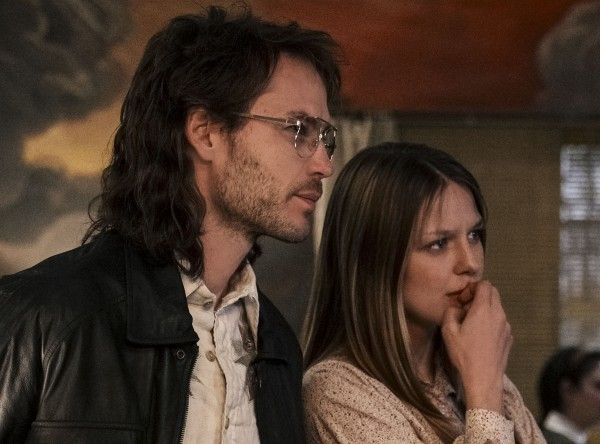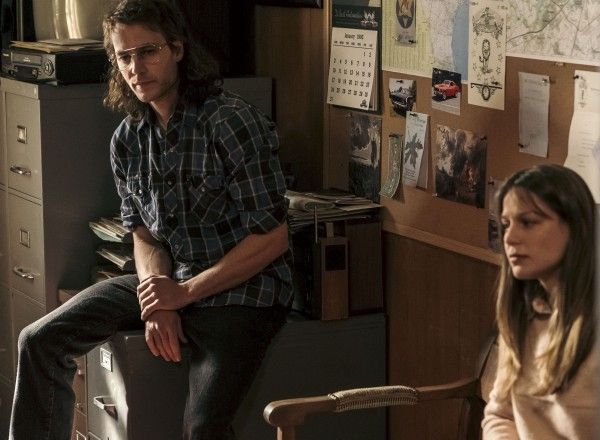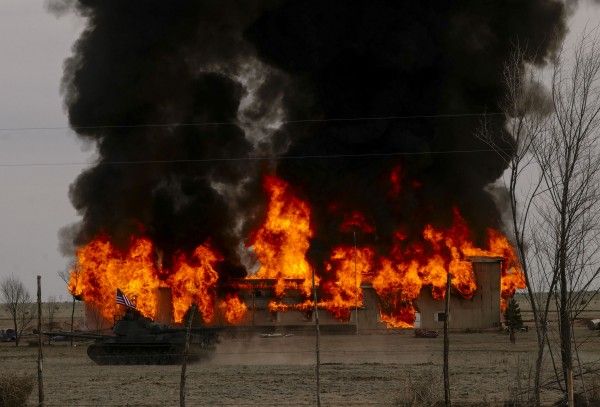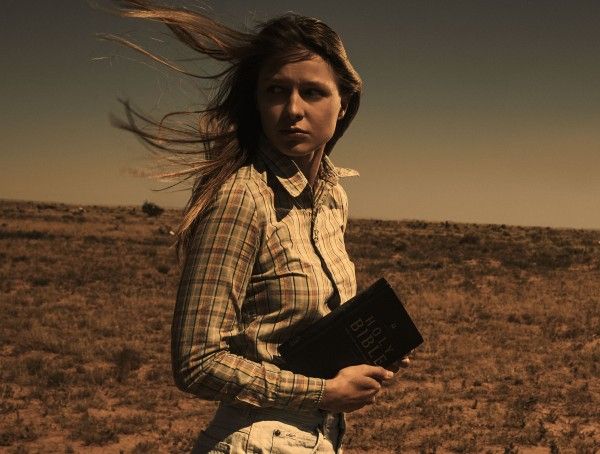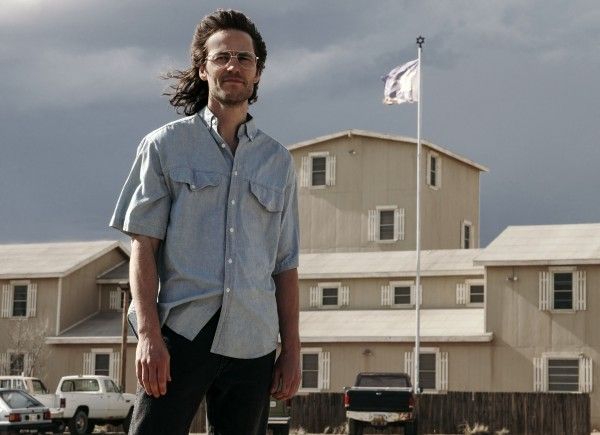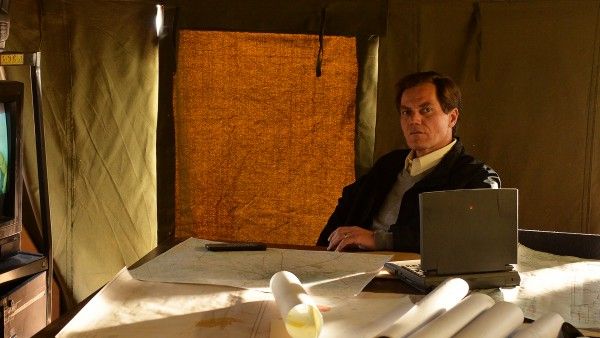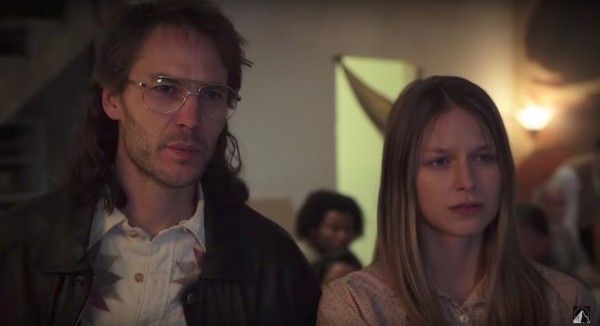Waco, the six-part Paramount Network TV event, tells the story of David Koresh (brilliantly played by Taylor Kitsch), the Branch Davidians, and the 51-day stand-off that resulted in the deaths of nearly 80 men, women and children. Government recklessness, religious fanaticism, conspiracy theories and cover-ups all muddied the waters, when it came to understanding what really happened on Mount Carmel in Waco, Texas, between a small religious community, the ATF and the FBI. From creators John and Drew Dowdle, the series also stars Michael Shannon, John Leguizamo, Melissa Benoist, Paul Sparks, Julia Garner, Shea Whigham, Andrea Riseborough, Rory Culkin and Camryn Manheim, among others.
While at the TCA Press Tour presentation for the Paramount Network, Collider got the opportunity to sit down with Melissa Benoist to chat for this 1-on-1 interview about the appeal of Waco, why she wanted to play Rachel Koresh, how she approached playing someone that was not always easy to understand, the biggest challenges of this project, what she hopes people take away from this story, and how jarring it was to get back into the headspace of Supergirl, for her CW series.
Collider: If you were looking for a character that’s different from Supergirl, I can’t imagine that you could find one much different than the wife of David Koresh.
MELISSA BENOIST: True!
Was that the appeal of doing this role?
BENOIST: It certainly was a part of the appeal. I was initially just fascinated by the Branch Davidians. This doesn’t really apply to Rachel Koresh because she was born into the church and that was all she had ever known, but I was fascinated by the psychology of how people get to that place – a place like Mount Carmel and an FBI stand-off for 51 days. That was the initial appeal. Of course, every actor wants to play as many roles on the Richter scale as they can, and Rachel Koresh certainly is very different from Supergirl, but she shares a lot of the strength that Supergirl has.
Just not the same level of positivity.
BENOIST: Right?! She’s not about truth, justice and the American way.
Was Rachel Koresh a woman that you found yourself able to understand, as far as her motivations and why she was okay with certain things that were happening?
BENOIST: A part of my job, when I’m playing a character and approaching a role, is to rationalize and to not judge, whatsoever. Even if there were things that I didn’t understand or couldn’t comprehend, which was a lot of this story because it’s so complicated and so much of it is a grey area, I still approached Rachel with an open mind and an empathetic heart. There’s no other way to tell her story. What she went through was very tragic. Also, the atmosphere on set was so much of a community. We really cared about shaping this world and telling this story truthfully, as to what happened at Mount Carmel, inside of the building that everyone saw on the news so much. That lent itself to allowing us to just let go and be free to tell these people’s story.
That’s really important because, up until now, we’ve only gotten to see these people as villains.
BENOIST: They’ve only been demonized, and their narrative is so important to me. For all intents and purposes, Koresh aside because what he did was wrong and there were a lot of things about him that weren’t palatable, the people in that compound were just people and a lot of them were really good people. They took care of each other. They were so isolated and sequestered, and they had established their own little society and rules for how to live, and it worked for them. That is an important story to tell, when something goes so awry. Whether you agree with every method of their way of life, what I experienced, in being around a community of people that were all very careful about the way we told the story and did a lot of research, was that there was just a lot of love there. What they took primarily from the Bible was how to be a good person and how to treat other people. What they were doing is what they thought was right. They thought the rest of the world was living the wrong way.
What were the biggest challenges for you, in playing Rachel Koresh?
BENOIST: Some of the biggest challenges were filling in a lot of the gaps because there wasn’t a lot of tangible information for me to base developing a character on. She was in a lot of pictures with David, and she was always in the background and always holding a child. There are a few accounts of her being around, but for all intents and purposes, she was sort of a mystery to me, so that was difficult. I had to really feel a lot of it, and put on the clothes, be in the building, and be around Taylor Kitsch, who underwent a massive physical transformation. He lost a lot of weight and grew his hair out and wore these aviator glasses. Also, the challenge was that the subject matter was so heavy. Spending three months with these people, the end was truly difficult and is something that I’ll carry with me, forever. It’s something I don’t think I’ll ever shake.
Was it nice to have Supergirl to go back to, after an experience like that?
BENOIST: It was so weird to go back to Supergirl. It was quite a jarring turn. Within a week, I was fighting villains and doing the tongue-in-cheek comic book quippy things. I was in such a different headspace, so it was a transition, for sure.
Was it more challenging to go back to playing Supergirl than it was to go into playing Rachel Koresh?
BENOIST: Yes, absolutely! Supergirl was already familiar, so I knew what I was working towards. But where I had ended on Waco was so deeply emotional and sad, so it was definitely harder to go back to Supergirl.
Were there challenges in fitting Waco into your Supergirl schedule?
BENOIST: Yes, there were a lot of logistical challenges. There was a finite amount of time, and somehow, it just fit. I was lucky that it worked out the way it did. It was a completely different meal to savor and wet my chops on, so to speak.
Since there is so much that we don’t know about these people or what really happened during the stand-off, what do you hope people take away from seeing who these people were?
BENOIST: What I hope happens is that people watch it with an open mind and an open heart, whatever your preconceived ideas of this story or event are. We live in a world that feels very divisive right now, and there’s always so much more than meets the eye. I do think this is such a tragic story and I hope people are able to get a better picture of things not being black and white. It’s a massive grey area, where the scale is constantly moving.
What did you like about Rachel Koresh?
BENOIST: She was so stoic, at least the way I chose to play her. She doesn’t do as much of the talking on this show, but her actions speak so loudly. What I liked about her was that, in her relationship with David Koresh, one of the survivors of the fire – the Branch Davidian David Thibodeau – was there, ever day, and he said that she was one of the only people that David would actually listen to, but I think she only did it behind closed doors. She was extremely strong and had been there her whole life. I think she had a lot of power and held it internally, and she had a lot of pride. I respected her, actually. I think she was a woman who knew her purpose, or felt that she knew, and really committed herself to it.
Did you have trouble reconciling how Rachel could devote herself to the love she had for David, but still be okay with him having children with all of these other women?
BENOIST: I didn’t have trouble, but I found it fascinating. Rachel had a dream that David should marry her younger sister, which he ended up doing. It was her request from God that her younger sister marry her husband and have children with him. I don’t know how to reconcile that and I don’t know how she truly felt. I never will. That was another challenge of this. There’s so much we don’t know and there’s so much we never will, tragically, because they perished the way they did. There was a lot that I don’t know how to reconcile. All I can do is respect that that was her life. She was very enigmatic. Jealousy is a human emotion, regardless of whether you’re a Branch Davidian, or you’re whomever, outside in society. She had to have felt it, especially when it was her sister. That couldn’t have felt normal, even though that was her reality. I didn’t know whether any of them, on the inside, had ever started to doubt Koresh during the siege, but I knew that Rachel would have felt was an intense passion to protect her children. That’s also something that we explored, and that was quite heartbreaking.
Without getting specifically political or religious, when you do a project like this and tell a story like this, does it make you look at politics, government and religious differently?
BENOIST: Absolutely! During filming, we would have conversations, constantly, but some of the conversations were about sympathy and how these people weren’t bad people and how they weren’t a cult. They were sorely misrepresented. It was surprising how much my perspective changed and how the things that they believed in, thought and felt started to seem rational, even if they weren’t. When we were in that moment, so in the thick of it, surrounded by their way of thinking, Taylor Kitsch would given sermons to us, it’s not that it completely changed my spirituality or my political stances, but it certainly gave me a new perspective. It gave me a broader way of approaching people and seeing their humanity, or at least trying to, even when I don’t understand them because there’s a lot of that right now.
Waco airs on Wednesday nights on the Paramount Network.


